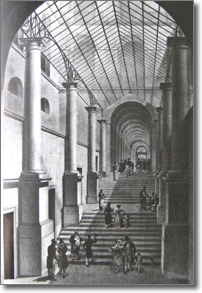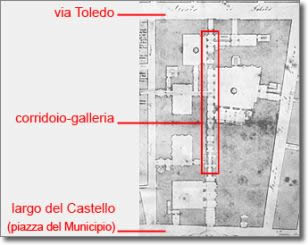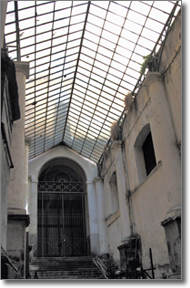The multifunctional corridor

- S.Gasse - G. Dura, covered walkway in the Ministries of State building about 1830
"A wonderful, light-filled, glass-covered arcade".... This was how a mid-Nineteenth century guidebook described the covered walkway which cut right through the Ministries of State Building.
It was a kind of 150-metre long corridor which had a glass roof but with skylights in parts. An iron framework supported the sloping roof which, because it was made of glass, meant that light flooded the whole structure.
There was a difference in level of about 7.5 metres between via Toldeo and the largo del Castello (today's piazza del Municipio) and so, to compensate, 28 steps were incorporated along the length of the arcade. About half way through was the entrance to the Gran Sala della Borsa or Stock Exchange, a sumptuous space with stucco vaults supported by eight columns, a marble floor and a statue of Flavio Gioia by Antonio Calì.
Apart from the technical and architectural features which were the forerunners of those used to build the Neapolitan Arcades at the end of the 1800s (in chronological order: Prince of Naples Arcade; Umberto 1 Arcade), what was really striking was the scene that met the eye of anyone looking up through the arcade from the main entrance. It was like looking through an imaginary telescope because you could see just a section of the square and, in the background, with the sun behind them, the silhouettes of people walking past the entrance on the castle side.

- plan of Ministries of State building, 1830
We do not know whether it was the designer's intention but over the course of its hundred-year history, this bright corridor-arcade became a meeting point for Neapolitans and much more besides.
Business appointments were made here, people used it to shelter from the rain, it was a nice space to have a quiet chat between popping in to the Council or Ministerial offices and it was also where street vendors sold their wares and there was even a market. Early twentieth-century accounts tell us that left-over toys and dolls from a festival market in the Spirito Santo area were once offered for sale in the glass corridor.

After the San Giacomo island was divided up and work was done on the new Banco di Napoli in the 1930s (see: the side that was) only a small section of the "covered, light-filled walkway (...) which crossed from one side of the building to the other..." remained, accessible from the area between the two main staircases on the ground floor.
Virtual tour of the old covered walkway